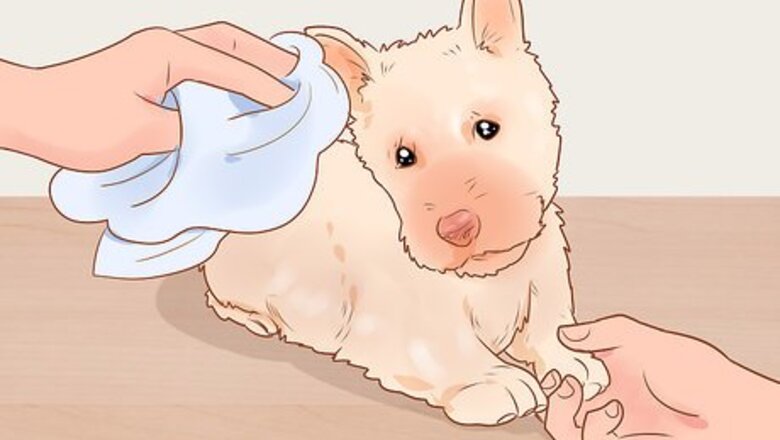
views
X
Trustworthy Source
American Kennel Club
The American Kennel Club (AKC) is a purebred dog pedigree registry in the United States. The AKC advocates for the responsible ownership of dogs and promotes purebred dog events, such as the Westminster Dog Show.
Go to source
As with any other dog breed, it's important to keep a Scottish Terrier well groomed. Each week, help your Scottish Terrier be at its best by caring for its coat, brushing its teeth, clipping its nails, and keeping its eyes and ears clean. Grooming can take a lot of work, but having a happy, healthy, good-looking dog will be worth the effort.
Teaching Your Dog to Allow Grooming
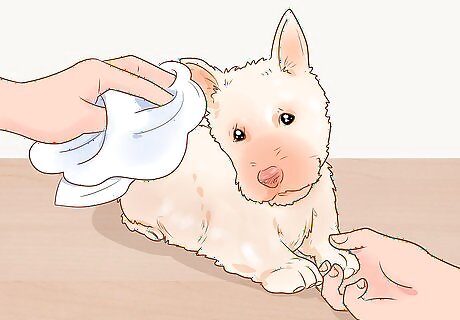
Start grooming when it's a puppy. Your pet needs to be trained for grooming, so start as early as possible. Start by handling its feet and examining between its paws. Then check inside and outside its ears, as well as under its belly. If the puppy resists, gently continue examining him. Give him lots of pets and praise to teach him that this is a positive thing that can be good for him. Offer the puppy a treat after you handle it.
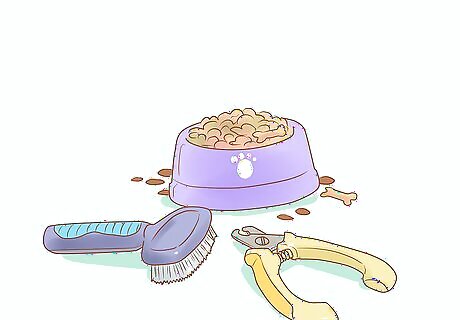
Pair the grooming tools with good things. Place the hair clippers, nail clippers, and brush near your pup's food or toys so that it starts to see the tools in a more positive way. This way your pet will no longer run away when it sees you coming toward it with the clippers or brush. You can also put food on the handles of the clippers or brush and let your dog lick it off. Don't leave your pet unattended while the grooming tools are out. Do this often so that your pet has time to associate the grooming tools with the food or toys.
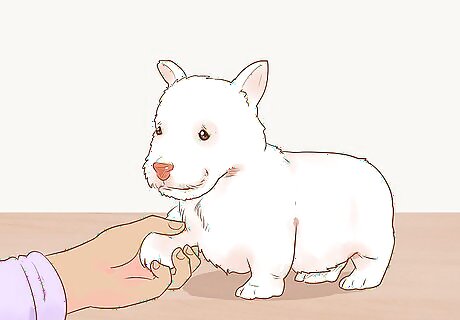
Train the dog to allow its feet to be handled. As you handle the pup's feet, give it a treat as a reward. This works best if you have a partner because one person can handle the dog's foot while the other holds the dog and provides a treat. Don't trim the nails at first. Just get the dog used to having its foot handled. Once the dog gets used to having its feet handled, place the clippers near the pup's feet as you handle them. When the dog is comfortable with the clippers near its feet, start clipping the nails.
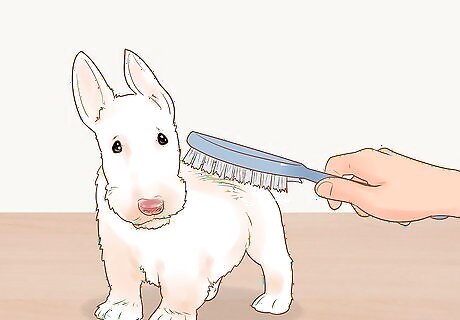
Teach your dog to allow brushing. Place the dog on a table or other waist-high structure. Brush your dog with slow, gentle strokes. Offer praise and petting as you brush the dog. If the dog struggles or resists the brushing, continue brushing but slow down your movements and increase your soothing praise.
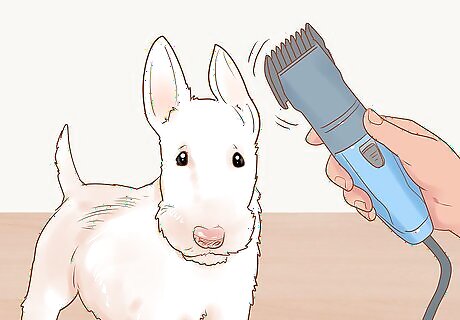
Give the dog time to get used to the sound of the clippers. Before using electric clippers on the dog, get the pup used to hearing the noise from the clippers without panicking. Start by having someone turn on the clippers on the other side of the room. When the dog stays in the room, feed it a treat and praise it for good behavior. Then move the clippers a little closer to the dog, rewarding it for staying in the room. After the dog is able to stay calm with the clippers near it, try clipping a superficial amount of hair. Give the dog plenty of praise and a treat.
Brushing Your Scottish Terrier
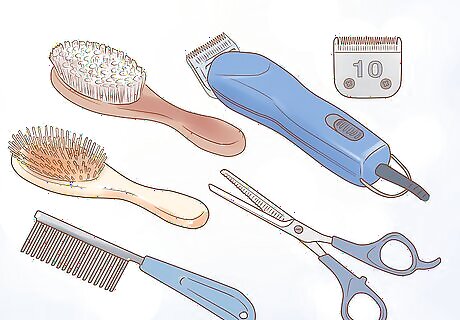
Purchase high-quality grooming tools. Grooming your Scottish Terrier will require different types of grooming tools. High-quality tools will be more expensive, but will last longer and help you groom more effectively without hurting your Scottish Terrier. Below are tools that you’ll need to care for its coat: Coarse brush Pin brush Metal-toothed comb Thinning shears Electric clippers with a #10 blade (#8.5 blade optional)
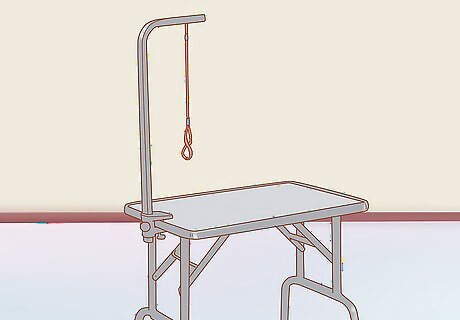
Set up the grooming area. Your Scottish Terrier will be much easier to groom when it's on an elevated surface, like a grooming table. Put the grooming table in an area that has good lighting. Organize all of your tools so everything you need will be close by. Having your Scottish Terrier on a table will keep you from bending over and hurting your back while you groom. Grooming tables are available online or at pet stores. If you do not want to buy a grooming table, you could use a sturdy card table.
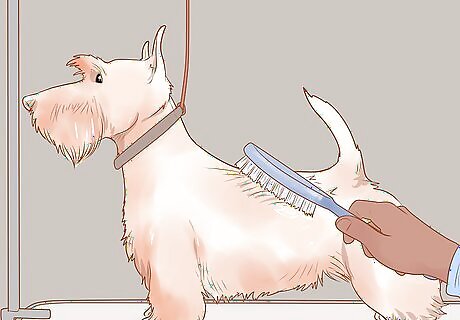
Brush your terrier once a week. Scottish Terriers have two coat layers: a soft, wooly undercoat and a coarse, weather-resistant outer coat. To keep your Scottish Terrier’s coat in good condition, brush it at least once a week. Use this time to check its skin for anything abnormal (redness, lumps, scrapes). Here are general tips for good brushing technique: Always be gentle. Brush in the direction of hair growth, working outwards from the skin.
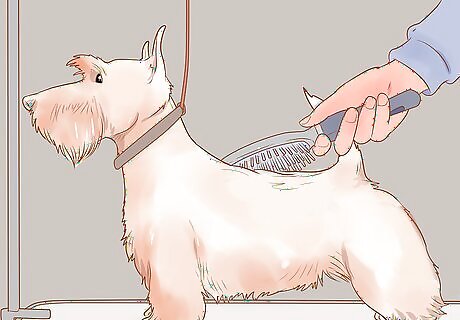
Start with the pin brush. A pin brush has wire bristles that painlessly remove loose, dead hair. Brush through the undercoat and outer coat. It may help to brush in small sections at a time. Brush the eyebrows and beard forward. Also, don’t forget the easy-to-miss areas, like the elbows and inner thighs. If you see knotted hair, do not yank through the knot with the brush. Yanking would be painful. If you cannot brush through the knot, leave it until later.
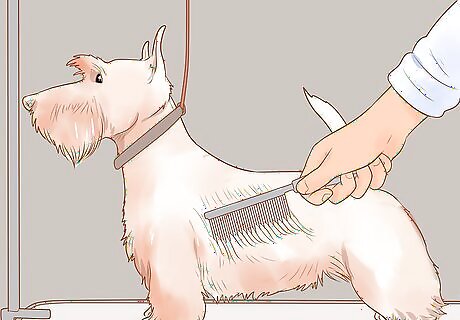
Comb through the coat. Combing through the coat will help you remove knots that didn’t come out during brushing. When you get to the knots, spray some detangling spray on them. Let the spray sit for a few minutes, then comb through each knot. If the knots are large, use your shears to split the knot into small vertical sections. Then, comb through each small section until the hair is smooth again. If you decide to use a detangling spray, look for one that is formulated for dogs. You can find these at pet stores or online.
Clipping Your Scottish Terrier
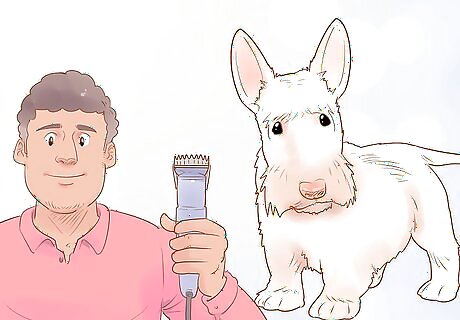
Decide whether you want to do the clipping. Clipping a Scottish Terrier takes time and practice. If you feel uncomfortable about using electric clippers, or don’t have time to clip at home, take your Scottish Terrier to a professional groomer. Clipping should be done four to six times a year. Professional groomers can be expensive. If you decide to do it yourself, be patient and work slowly. Use a picture of the typical Scottish Terrier coat appearance to guide you as clip the coat at home.
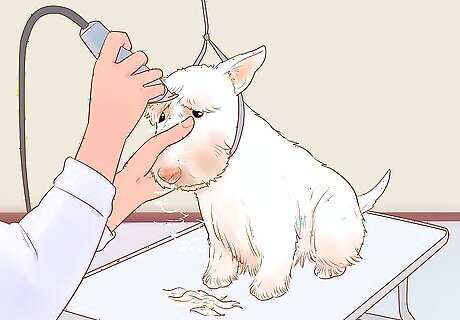
Begin with clipping the head. After attaching the #10 blade to your electric clippers, start at your Scottish Terrier’s head. Move the clippers from the eyebrows to just in front of the ears. Also, clip from the chin down to your Scottish Terrier’s chest.
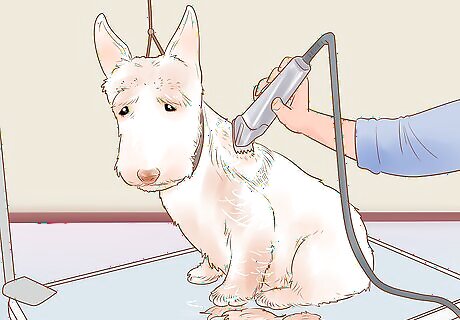
Clip your Scottish Terrier’s body. With your Scottish Terrier’s head clipped, use the electric clippers on the back, legs, and sides. Continue moving in the direction of hair growth. As you clip the body, make sure you clip equally on both sides—use a mirror to ensure both sides are evenly clipped.
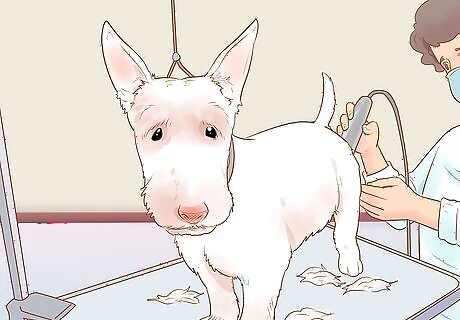
Be careful when clipping sensitive body parts. The genital and anal areas can be very sensitive. Use extra caution when clipping the hair in these areas. If you do not feel comfortable using the clipper in these areas, trim the hair with your thinning shears instead.
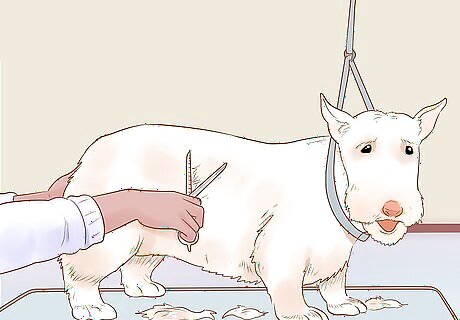
Use your thinning shears. For some areas of your Scottish Terrier’s coat, it will be easier to use thinning shears instead of an electric clipper. For example, use the shears to trim and shape the hair on the tail. Also, use the shears to trim the hair on the outside edge of the ears and excess hair inside the ears. To trim the eyebrows, hold the shears parallel to the side of the head. Trim the eyebrows so the inner eyebrows are longer than the outer eyebrows. Be very careful near the dog's ears and other sensitive areas so that you don't accidentally cut the dog.
Performing Other Grooming Tasks
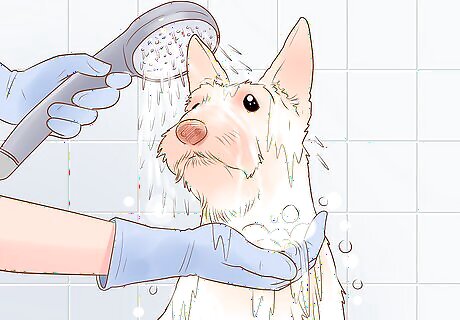
Bathe your Scottish Terrier. Don’t bathe your Scottish Terrier too often, since frequent baths can dry out its skin. Give your Scottish Terrier a bath only when necessary, such as when it starts to smell or has rolled around in something that stinks or can’t be brushed out. Here are some tips for the bathing process: Brush and comb your Scottish Terrier beforehand to remove loose hair and tangles. Rinse out all of the shampoo so your Scottish Terrier’s skin doesn’t feel itchy. Ask your veterinarian for a shampoo recommendation. Dandruff shampoo is usually a good option for Scottish Terriers, but make sure that you only use shampoos that are labeled for use with dogs. Check your dog's skin at this stage for parasites, infections, and skin conditions. Consider using a dog-safe hair dryer to complete the drying process. If it’s time for a hair clipping, wait to do it until after a bath when the hair will be clean.
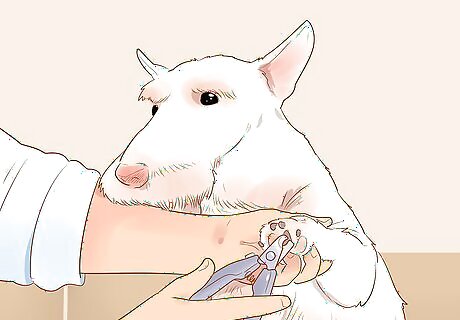
Trim the nails. Keeping your Scottish Terrier’s nails trimmed won’t be just for good looks. Short nails will make it easier for your Scottish Terrier to walk and have proper balance. Purchase a pair of nail clippers (guillotine or scissor type) at your local pet store. When you trim the nails, be careful not to cut the quick, which is the thin vein running through each nail. If the nail starts bleeding, dab a small amount of cornstarch or styptic powder on the nail. Guillotine-type nail clippers may be a little easier to use than scissor-type nail clippers. When the nails start clicking the floor, you’ll know it’s time for a nail trim.
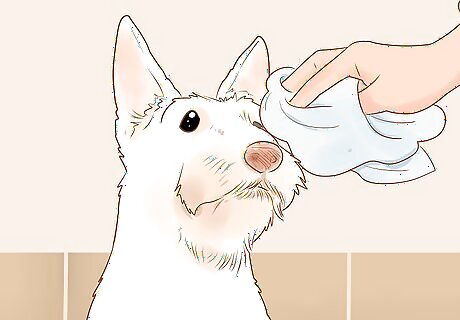
Clean around the eyes. Dogs can sometimes get crusty goop in the inner corners of their eyes. If you see this goop around your Scottish Terrier’s eyes, use a clean damp cloth to remove it. Check the eyes weekly. If they don’t look healthy (colored discharge or redness), take your Scottish Terrier to your vet.
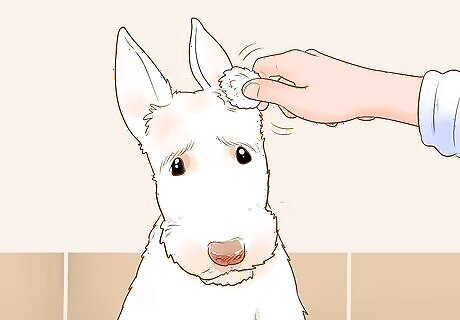
Clean the ears. Keeping your Scottish Terrier’s ears clean will help prevent ear infections. If you notice a buildup of wax or debris in the ears, gently clean them. Here are some tips for ear cleaning: Use a clean cotton ball, not a Q-tip. A Q-tip can damage the ear canal. Get a dog-safe ear cleaner from your vet. Wipe from the inside out to make sure you don’t rub the wax or debris back into the ear. If you see signs of ear problems (swelling, redness, bad odor, scrapes), take your Scottish Terrier to your vet.
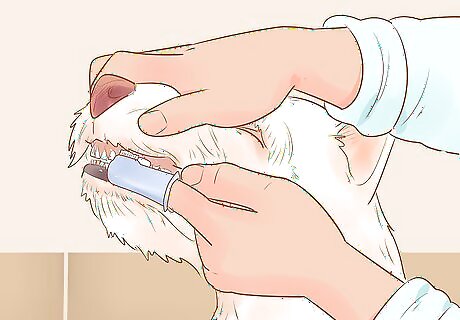
Brush the teeth. Dental disease in dogs can be very uncomfortable and possibly lead to other health problems. Brushing your Scottish Terrier’s teeth a few times a week will help prevent dental disease. Use toothbrush and toothpaste made for dogs. When you brush the teeth, check for signs of dental disease (bleeding or swollen gums, bad breath, loose teeth). Dental disease requires veterinary treatment.




















Comments
0 comment